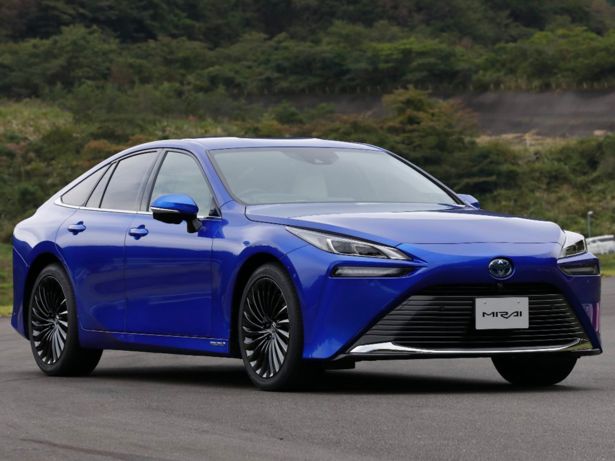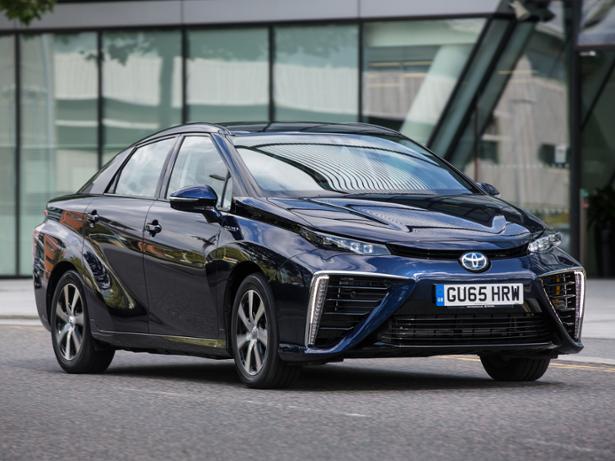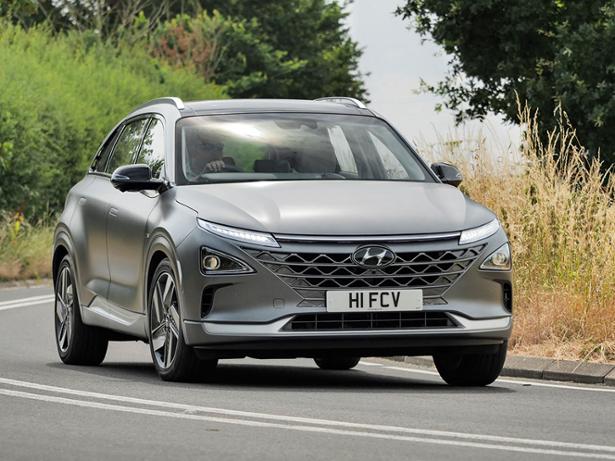- best buy
- Comfort and practicality
Full Access first month £5, then £10.99 per month, cancel at any time

You can trust our best electric cars picks because at Which?, every car we review is subjected to more than 100 individual tests in a lab, on a test track, and on real roads – and we really clock up the miles, driving around 500 miles in every car we test.
Because Which? is independent, you can rely on our reviews to give you the full, honest and impartial truth about every car we test.
Electric cars create zero exhaust emissions and the potential for very low day-to-day running costs. But not all electric cars are created equal. We know from our extensive owner surveys that some electric cars require extensive trips to your local mechanic – so make sure you read our new and used car reviews before you buy.
We've also tested a duo of hydrogen fuel-cell cars, another type of zero-emission car that's yet to go mainstream, but may take off in the future.
This table contains the highest scoring, zero-emission electric cars from our tests that you can buy brand new.
To make it as one of our coveted Which? Best Buys, a car has to impress across the board in our independent tests and surveys, including driving performance, safety, practicality and reliability. If a car doesn't excel in our rigorous assessments, it won't feature in our recommendations.
Which? members can log in to see the electric cars we recommend, as well as those we don't. If you're not already a member, join Which? to reveal our best electric cars and all of our expert car reviews.
Full Access first month £5, then £10.99 per month, cancel at any time
Full Access first month £5, then £10.99 per month, cancel at any time
Full Access first month £5, then £10.99 per month, cancel at any time
Full Access first month £5, then £10.99 per month, cancel at any time
Full Access first month £5, then £10.99 per month, cancel at any time
Full Access first month £5, then £10.99 per month, cancel at any time
Drive smarter and cut costs using our expert advice. Get our Cars newsletter – it's free monthly
Save money without the risk of buying a car that will let you down, with our used electric car picks. Recommendations are based on the highest scoring cars you can no longer buy new.
Full Access first month £5, then £10.99 per month, cancel at any time
Full Access first month £5, then £10.99 per month, cancel at any time
Full Access first month £5, then £10.99 per month, cancel at any time
Save yourself from range anxiety and the potential for big bills by steering clear of these models.
Full Access first month £5, then £10.99 per month, cancel at any time
Full Access first month £5, then £10.99 per month, cancel at any time
Full Access first month £5, then £10.99 per month, cancel at any time
Below are our top tips on buying and owning an electric car.
Read on to find out what electric cars are like to drive and how far they can go before you have to charge the battery.
The lack of pistons and noisy combustion means electric cars can ghost along very quietly at city speeds, and they tend to be very nippy. The surprising turn of speed from a standstill can take the uninitiated by surprise, so make sure you take it slowly the first few times you drive one.
The lack of noise can seem peculiar at first, as can be the total absence of engine vibration, but these are two big advantages of driving an electric car.
The basics of driving an electric car are the same as any other car. There's still an accelerator and a brake pedal. But in other ways an electric car can seem strange to a seasoned driver.
Some models, including the Nissan Leaf, can be driven using just one pedal. So when you lift off the accelerator, the car uses heavy regenerative braking to slow down the car significantly (enough to illuminate the brake lights) and feed energy back into the battery. It can take a little getting used to and there's still a separate brake if you'd prefer to drive conventionally.
Don't even think about using a domestic three-pin socket to charge your car. This is slow. Very slow. We're talking in excess of 35 hours' worth of slow, depending on the car.
For regular charging at home, if your property allows it, you'll be best off investing in a dedicated fast charger. This normally takes the form of a wallbox mounted on the outside of your house. The type of charger, connector and wattage you need will depend on your car, budget and what electricity connection you have.
When you're away from home, you can use websites or apps to find out where your nearest public charging point is. These include on-street charging points in city centres, for example, as well as the growing number of high-voltage fast chargers and rapid chargers at strategic service stations on the motorway network.
Currently, charging points are run by a variety of separate networks, so you’ll need to work out which ones are compatible with your car, and register with them accordingly. And bear in mind that some public charging points can be very costly when compared with rates for home charging, with some providers billing based on the duration of the charge, rather than the amount of electricity consumed.
See our dedicated electric car charging guide for all you need to know.
If you're planning to buy an electric car, check the maximum range of the electric cars in your shortlist, especially if you regularly drive long distances. And don't forget to factor in your charging time, too, if you need to top up at any time other than overnight.
The maximum driving range available can vary greatly between models. Luxury models with larger batteries offer greater claimed driving ranges, but even entry-level models should offer a driving range of around 150 miles.
However, don't just look at the official figures. At Which? we do our own realistic range tests because, just like fuel tests, the figure manufacturers quote are often quite ambitious.
We've found cars that fall more than 30 miles short of their quoted range. If you don't want to be caught out, make sure you check out the real, independently tested ranges in our electric car reviews.
Electric cars may be cheap to run but they can suffer on boot space. The huge batteries that keep the cars going need to go somewhere, and often that's in the boot. The same goes for plug-in hybrids.
Plug-in hybrid models can also have smaller fuel tanks to make more space for batteries, so you may need to fill up more often on longer journeys, particularly if you don't regularly charge it up.
Car manufacturers vary in the way they measure boot space. We measure the boot of every car we test to work out the usable amount of space, so you can use our figures to compare boot sizes and make sure you buy the car that's right for your needs.
For more information about our independent lab and road tests, see how we test cars.
We take a look at grants for electric cars and chargers and what tax you'll pay.
Not anymore. The plug-in car grant (PiCG) used to be available through OZEV (Office for Zero Emission Vehicles) and reduced the cost of buying a new electric vehicle. However, after being gradually declined in recent years, it was abolished as of 14 June 2022.
Dealerships or classifieds? Discover the best place to buy a car
The EV Chargepoint grant removed up to 75% (capped at £350) of the cost of a wall charging unit fitted by one of its approved suppliers, provided it's a smart charger. This grant was only open to those in flats and rented accommodation.
The EV Chargepoint grant replaced the previous Electric Vehicle Homecharge Scheme (EVHS) grant, which was open to those who own their own homes.
If you’ve already applied for an EVHS grant and your case is under consideration, you do not need to submit a new application under the EV Chargepoint grant scheme.
If you live in Scotland, you may qualify for additional funding via the Energy Saving Trust.
Find out more at the Office for Zero Emissions Vehicles website, and the Energy Saving Trust site.
Until 2025, electric cars are completely exempt from car tax in both the first and subsequent years, as they emit zero CO2.
As of April 2020, electric cars costing more than £40,000 were also made exempt from the 'expensive car supplement', which sees most cars priced above £40,000 (including options) liable for an additional £335 per year of car tax for years two to six.
For more on the rules around taxing your car, read our guide on car tax explained.
There’s another kind of zero-emission car on the horizon, too – hydrogen fuel-cell cars (or fuel-cell electric vehicles – FCEVs), such as the Toyota Mirai and Hyundai Nexo.
Like electric cars, FCEVs have electric motors, but they are powered by hydrogen. This makes them faster to refuel than battery-powered electric cars. Filling a car with hydrogen takes about as long as filling a car with petrol.
Hydrogen cars retain the other benefits of electric cars, such as being near-silent, smooth and quick to accelerate.
Unlike electric cars, hydrogen powered cars do have an exhaust – but the only thing that comes out of it is water.
Hydrogen refuelling stations are currently extremely limited in the UK and the cars are very expensive, making them far from ideal for most people right now, but that may change if the powering method gains traction.
Hydrogen fuel-cell cars are still pretty new, so there aren't that many on the market. We've tested three of them so far – you can see how they performed in the table below.
Which? members can log in to see our hydrogen car test results. If you're not already a member, join Which? to reveal the scores and get access to all of our expert car reviews.

Mirai (2021-)
Full Access first month £5, then £10.99 per month, cancel at any time

Mirai (2015-2021)
Full Access first month £5, then £10.99 per month, cancel at any time

Nexo (2018-)
Full Access first month £5, then £10.99 per month, cancel at any time
Our tests go further than those carried out by other organisations, and because Which? is independent, you can trust our reviews to give you the full, honest and impartial truth about every car we test.
Every car we review goes through more than 100 individual tests in a lab, on a test track, and on real roads – and we really clock up the miles, driving around 500 miles in every car we test.
Testing in controlled lab conditions means the results we collect are directly comparable between different cars, helping us determine exactly which models are better and why, and helping you find the perfect car for your needs.
And so you know which cars are likely to prove reliable for years to come, we also gather feedback from thousands of UK car owners through the Which? Car Survey, using it to generate detailed reliability ratings for the cars we test.
Drive smarter and cut costs using our expert advice. Get our Cars newsletter – it's free monthly